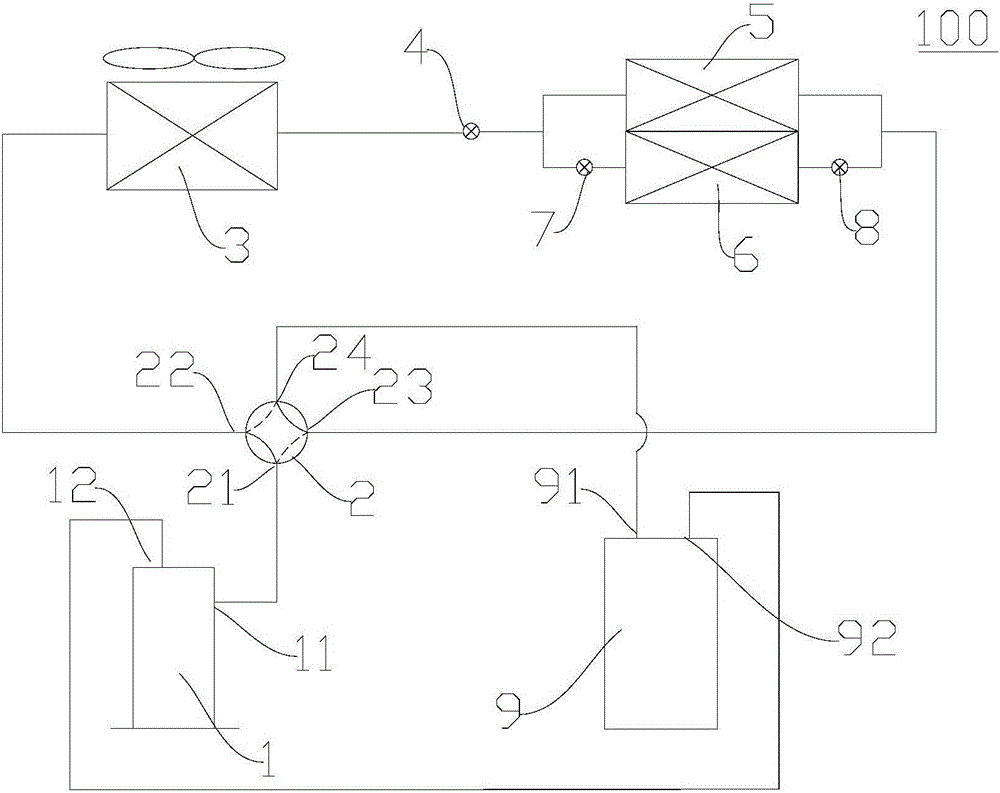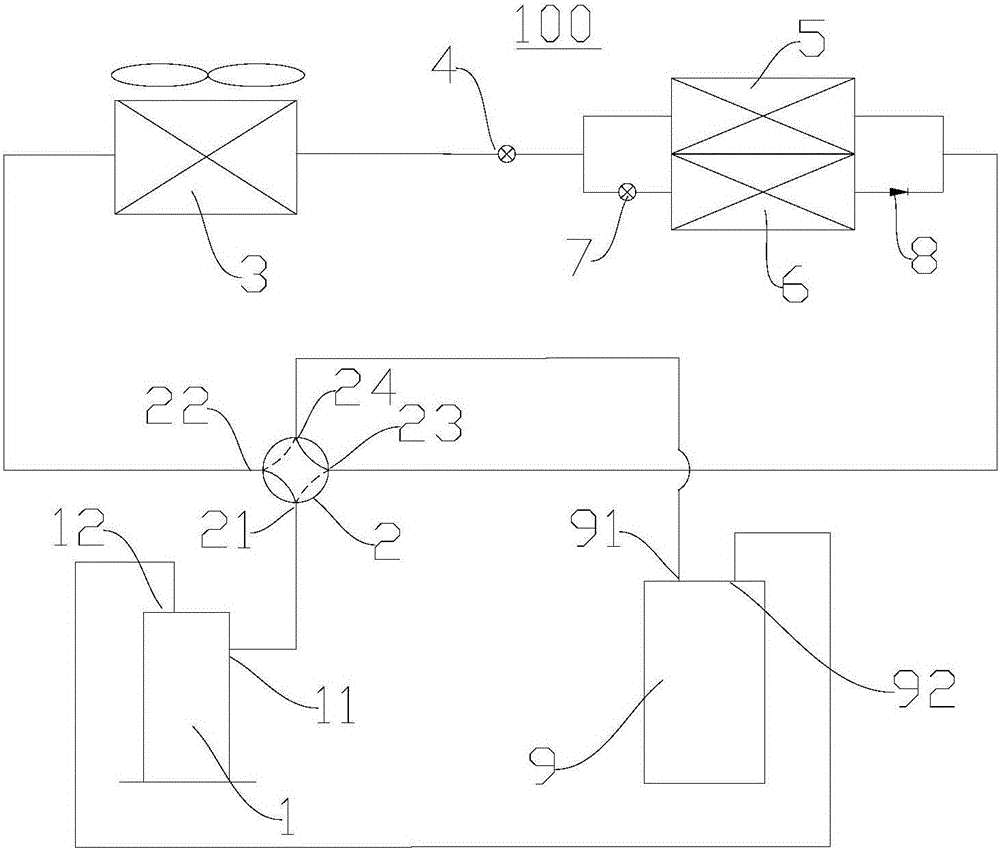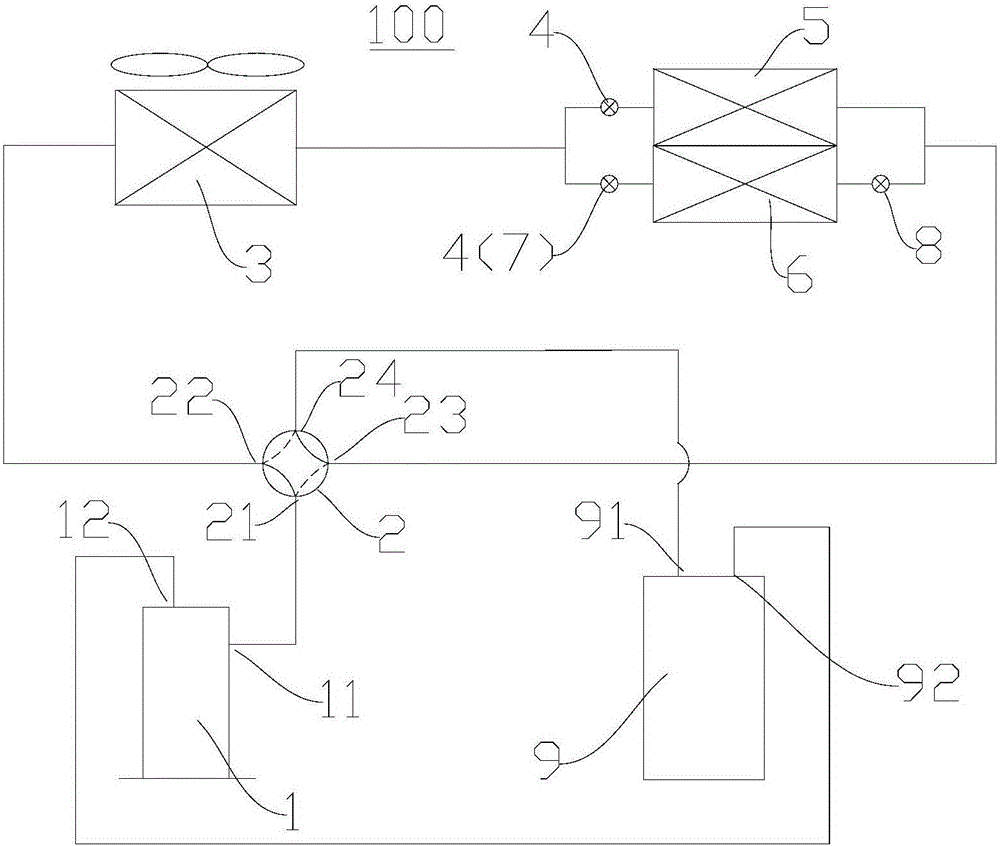Air conditioner and control method thereof
An air conditioner and control valve technology, which is applied in heating and ventilation control systems, refrigerators, heating methods, etc., can solve the problems of large heat exchange area of indoor heat exchangers, accumulation of refrigerant in indoor heat exchangers, etc., to avoid absorption Increase the specific volume of gas, avoid the reduction of exhaust pressure and return air pressure, and solve the effect of excessive heat exchange area
- Summary
- Abstract
- Description
- Claims
- Application Information
AI Technical Summary
Problems solved by technology
Method used
Image
Examples
Embodiment 1
[0054] like figure 1 As shown, the air conditioner 100 in this embodiment includes a compressor 1, a reversing assembly 2, an outdoor heat exchanger 3, a throttling element 4, and a first indoor heat exchanger connected in parallel in the same indoor unit. 5 and the second indoor heat exchanger 6, the first control valve 7 and the second control valve 8. Wherein, both the first control valve 7 and the second control valve 8 are electromagnetic valves. The throttling element 4 is an electronic expansion valve.
[0055]Specifically, the compressor 1 has an exhaust port 11 and an air return port 12. The reversing assembly 2 includes a first valve port 21 to a fourth valve port 24. When the air conditioner 100 is cooling, the first valve port 21 and the second valve port 22 The third valve port 23 communicates with the fourth valve port 24 , and the first valve port 21 communicates with the third valve port 23 and the second valve port 22 communicates with the fourth valve port ...
Embodiment 2
[0066] like figure 2 As shown, the difference between this embodiment and Embodiment 1 is that the second control valve 8 is a one-way valve that conducts in one direction in the direction from the second indoor heat exchanger 6 to the third valve port 23 . In this embodiment, the working principle of the air conditioner 100 in cooling mode is the same as that in Embodiment 1 above.
[0067] It can be understood that when the air conditioner 100 is in the heating mode, since the second control valve 8 is a one-way valve, no refrigerant flows in the direction from the third valve port 23 to the second indoor heat exchanger 6 all the time. The second indoor heat exchanger 6, that is, the second indoor heat exchanger 6 is always in a shielded state. Specifically, when the air conditioner 100 needs to turn on the heating mode, first switch the operation mode of the air conditioner 100 to the cooling mode, and close the first control valve 7 to prevent the refrigerant from being ...
Embodiment 3
[0069] like image 3 As shown, the air conditioner 100 in this embodiment includes a compressor 1, a reversing assembly 2, an outdoor heat exchanger 3, two throttling elements 4, and a parallel-connected first indoor heat exchange set in the same indoor unit. 5 and the second indoor heat exchanger 6, the first control valve 7 and the second control valve 8. The second control valve 8 is a solenoid valve.
[0070] Specifically, the compressor 1 has an exhaust port 11 and an air return port 12. The reversing assembly 2 includes a first valve port 21 to a fourth valve port 24. When the air conditioner 100 is cooling, the first valve port 21 and the second valve port 22 The third valve port 23 communicates with the fourth valve port 24 , and the first valve port 21 communicates with the third valve port 23 and the second valve port 22 communicates with the fourth valve port 24 when the air conditioner 100 is heating. The first valve port 21 is connected to the exhaust port 11 , ...
PUM
 Login to View More
Login to View More Abstract
Description
Claims
Application Information
 Login to View More
Login to View More - R&D
- Intellectual Property
- Life Sciences
- Materials
- Tech Scout
- Unparalleled Data Quality
- Higher Quality Content
- 60% Fewer Hallucinations
Browse by: Latest US Patents, China's latest patents, Technical Efficacy Thesaurus, Application Domain, Technology Topic, Popular Technical Reports.
© 2025 PatSnap. All rights reserved.Legal|Privacy policy|Modern Slavery Act Transparency Statement|Sitemap|About US| Contact US: help@patsnap.com



